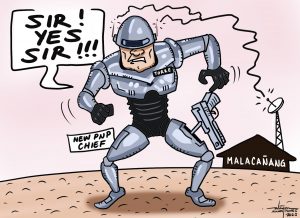Oh, this “House of Corruption,” PhilHealth, seems to continue dominating the national news headlines these days, and even during the past years.
Now the undesirable stories about the agency have become even more unpleasant to the ears and eyes of the saner Filipinos. What with the alleged multi-billion pesos allegedly lost and transferred to the pockets of its corrupt executives in connivance with even more greedy public and private hospital and clinic officials.
Yes, about a year ago PhilHealth was rocked with the anomaly involving reimbursement claims by a dialysis center in Metro Manila. According to the whistle blower the dialysis center has been submitting to the government health insurance firm reimbursement requests with several patients repeatedly included in the list of beneficiaries. Worst, according to the whistle blower, many of the persons included as being served by the dialysis center were already dead. They were just “resurrected.”
We have no doubt that the perpetuation of the anomalous practices could not have happened had there been no connivance between some people inside PhilHealth and from those of the center. And we believe that their wrong doings were tolerated by their superiors or could have been done on their behest.
Meanwhile, in the ongoing Congressional inquiry into PhilHealth’s alleged multi-billion money-making activities by its officials, several areas of the government firm’s operation have been tagged as the possible vehicles for syphoning the money to the corrupt officials’ pockets – greedy hospital executives’ pockets included.
Top in the list of sources of corruption is the Institutional Reimbursement System or the IRS. Here, according to the testimonies of PhilHealth executives who were invited as “resource persons” to the parallel hearings of the Senate and the House of Representatives, the accredited hospitals are given a menu of diseases covered by PhilHealth policies with fixed maximum amounts that can be charged to the system.
On a cursory look, everything in this scheme looks good. But a deeper scrutiny would reveal why the seed of corruption thrives in this system. And why not, when the PhilHealth releases in advance certain funds to the authorized hospitals where the latter draw the amount that is chargeable on the reimbursement system?
Another area where corruption has long been practiced at or with PhilHealth is the “upgrading” of certain illnesses and cheating on the number of days of treatment and confinement. On this particular aspect in doing the corrupt act, the cheating lies mostly on the hospital management or the doctors themselves.
The participation of PhilHealth and some of its people may be very minimal as this can be attributed to the agency’s lack of manpower and/or system to effectively monitor and validate cases submitted by hospitals for payment.
One example of this mode of cheating on PhilHealth is when a patient is diagnosed with simple cough. But instead of honestly telling the patient of his/her actual illness the attending medical practitioner tells the patient that the illness is evolving into potential pneumonia and there may be need for confinement. Thus, the likelihood is that the patient may have to fork in more money for the hospital stay and for medicines. Then the doctor will give the patient some viable options like allowing him/her to go home provided this and that medicine is bought and taken as prescribed.
Normally the patient who often is short of money for confinement would prefer going home and just buy the drugs prescribed by the doctor.
And, as an additional “act of goodness” the doctor would request the patient to sign on certain PhilHealth forms and commits that he’ll/she’ll do the rest. Naturally the happy patient signs with no hesitation. What he/she does not know is that in the doctor’s report and request for reimbursement to PhilHealth, the cough becomes pneumonia and the “go home and rest” becomes a two or even three days of confinement.
Converted into PhilHealth’s cash, how much would that amount to? And how many such patients have enjoyed that doctor’s “goodness”?
And here is another mode of cheating that may or may not have the connivance of the hospital management, the attending physicians and hospital-based PhilHealth personnel.
The attending physicians, mostly surgeons in surgical cases, advise the patient that he/she can give a discount on the professional fee provided the patient pays directly to the doctor. But the truth is that the amount discounted is still being reflected in the hospital bill and that a portion thereof is charged by the hospital to PhilHealth. Here the doctor does a dual cheating on the government. One is on the taxes payable to the Bureau of Internal Revenue (BIR); and the other is on the hospital itself which supposedly gets a percentage of the doctor’s fee.
And it was only during the House hearing that it was disclosed the funds accumulated from the payment of hospitals and other medical facilities to get PhilHealth accreditation have been used for allowances of the agency’s top executives. And it has been going for years until it was discovered by the Commission on Audit only lately.
No wonder we have a former regional PhilHealth executive in Mindanao whom we have known is now happily retired enjoying a luxurious farm house complete with urban amenities including a large swimming pool.
No wonder a former Davao politician who once made a name and had gone to near oblivion after losing in a previous election, told us his only wish is from President Rodrigo Duterte is to give him a Davao-based post at PhilHealth.
And no wonder a nurse who works not in the emergency room or directly assisting physicians in attending to patients but instead in the administrative department in a large hospital in the Visayas, has been claiming that aside from a P30 thousand plus monthly salary he/she also enjoys an average of P10 thousand a month allegedly from PhilHealth money.
So, there might be truth to one joke saying that PhilHealth is getting a new name, The House of Corruption.


